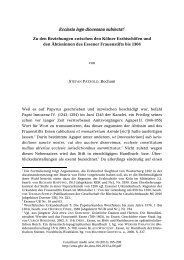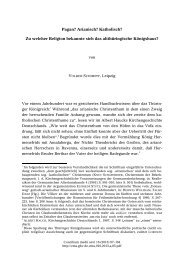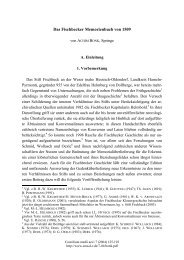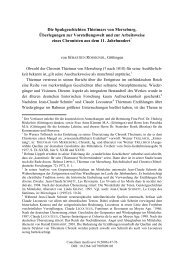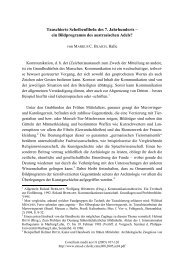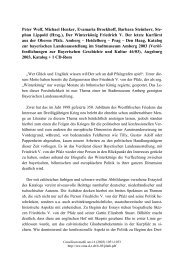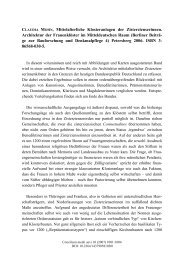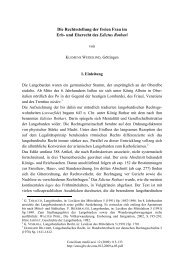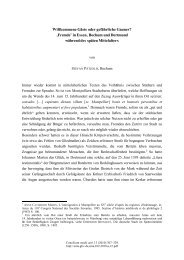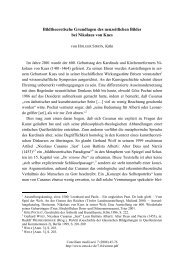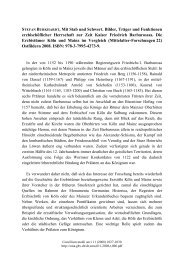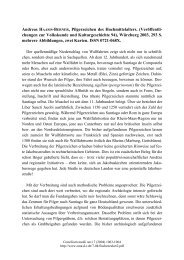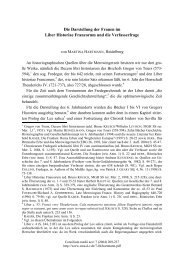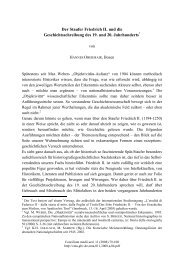Rabanus Maurus - Concilium medii aevi
Rabanus Maurus - Concilium medii aevi
Rabanus Maurus - Concilium medii aevi
You also want an ePaper? Increase the reach of your titles
YUMPU automatically turns print PDFs into web optimized ePapers that Google loves.
8<br />
FEE-ALEXANDRA HAASE: Rhetoric as praise of the emperor<br />
[...] ita quoque docendi et discendi instantia ordinet et ornet seriem verborum, ut,<br />
qui deo placere appetunt recte vivendo, ei etiam placere non neglegant recte<br />
loquendo. scriptum est enim: aut ex verbis tuis iustificaberis, aut ex verbis tuis<br />
condemnaberis (Matth. 12,37). quamvis enim melius sit bene facere quam nosse, prius<br />
tamen est nosse quam facere. debet ergo quisque discere, quod optat implere, ut tanto<br />
uberius, quid agere debeat, intellegat anima, quanto in omnipotentis dei laudibus sine<br />
mendaciorum offendiculis concurrerit lingua. 15<br />
For the trivium Alcuin chose the genre of the didactic dialogue to arrange the<br />
classical knowledge of ancient times in a new form. Alcuin’s Dialectica is structured<br />
the way the dialogue about the rhetoric is composed. Alcuin wrote five didactic works.<br />
All except one have the form of a dialogue. This form illustrates that many of his<br />
writings are used for the needs of his students. The Platonic tradition of the dialogue as<br />
method of education was renewed restoring the study of the liberal arts in Europe. The<br />
Ars grammatica consists of two parts: a conversation between Alcuin and his students;<br />
the grammar, in which a 14-year old Frankish pupil and a 15-year old Saxon pupil<br />
concern themselves mainly with morphology and etymology. De Orthographia is an<br />
alphabetical list of words, based mainly on Bede's De orthographia. The Disputatio de<br />
rhetorica et de virtutibus sapientissimi regis Carli et Albini magistri, The debate of the<br />
wisest king Charles and the teacher Alcuin, about rhetoric and the virtues is a<br />
moralizing political treatise, is a dialogue between Charlemagne and Alcuin.<br />
According to the edition of J.-P. Migne Alcuin’s work consists of letters, Exegetica,<br />
Dogmatica, Liturgica et Moralia, Hagiographica, poems such as inscriptions,<br />
epitaphia, epigrammata and Didascalia such as the writings Grammatica, De<br />
orthographia, Dialogus de rhetorica, De dialectica Pippini Regalis et nobilissimi<br />
juvenis disputatio cum Albino Scholastico. Dubia are Joannis Mabillonii disquisitio de<br />
antiquitate et auctore confessionis fidei sequentis Albini Confessio fidei Disputatio<br />
puerorum per interogationes et responsiones, Propositiones Alcuini doctoris ad<br />
acuendos juvenes Scripta alia nonnulla Alcuino dubitanter ascripta. On Computation<br />
was written in 820. 16 Alcuin composed more than 120 poems in hexameters, distichs,<br />
adonics with alliteration similar to that of Old English vernacular verse, sapphics, and<br />
15 Bibliotheca Augustana:<br />
http://www.fh-augsburg.de/~harsch/Chronologia/Lspost08/CarolusMagnus/kar_epli.html. [2.2.2004]<br />
16 Peter Dale SCOTT, Alcuin as a Poet. Rhetoric and Belief in his Latin Verse, in: University of<br />
Toronto Quarterly 33/3 (1964), Pp. 233-245, Pp. 235-250, P. 240f.



